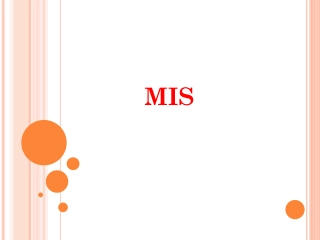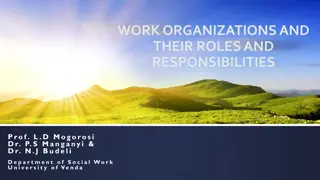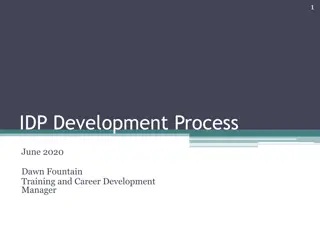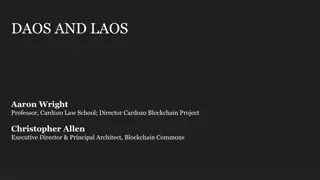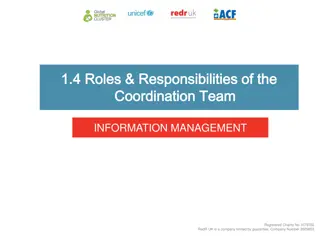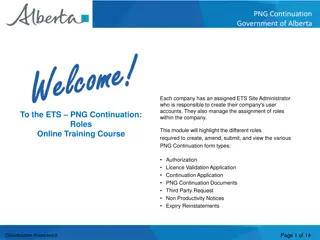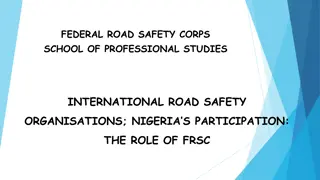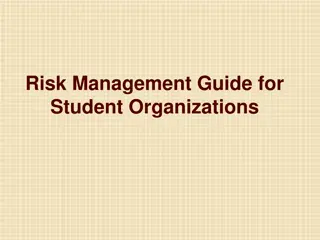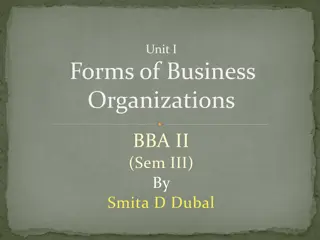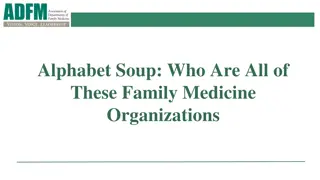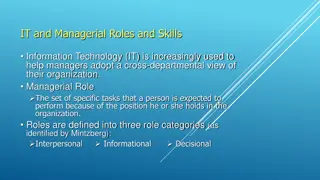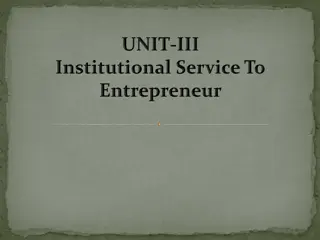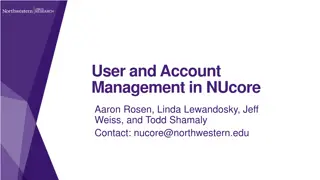Understanding Management Roles in Different Types of Organizations
Management roles vary across different types of organizations, including for-profit, nonprofit, and mutual-benefit organizations. Despite the differences, core management functions such as planning, organizing, leading, and controlling remain essential. Managers in each type focus on specific measures of success, such as generating profit for for-profits and delivering effective services for nonprofits and mutual-benefit organizations. Mintzberg's managerial roles of interpersonal, informational, and decisional play an important role in how managers operate within their organizations.
Download Presentation

Please find below an Image/Link to download the presentation.
The content on the website is provided AS IS for your information and personal use only. It may not be sold, licensed, or shared on other websites without obtaining consent from the author. Download presentation by click this link. If you encounter any issues during the download, it is possible that the publisher has removed the file from their server.
E N D
Presentation Transcript
MESLEK NGLZCE KISIM-4 SONER HOCA
Area of Management: Functional Managers V.S. General Managers
Area of Management: Functional Manager is responsible for just 1 organizational activity General Manager is responsible for several organizational activities
Managers for 3 Types of Organizations 1. For-Profit Organizations: For making money, or profits, by offering products or services Nonprofit Organizations: For offering services in either public sector or private sector such as hospitals, colleges, social-welfare agencies Mutual-Benefit Organizations: For aiding members such as farm cooperatives, labor unions, trade associations, and clubs 2. 3.
Do managers manage differently for different types of organizations?
Management for different types of organizations SAME DIFFERENCE 4 management functions planning, organizing, leading, and controlling are needed for all types Measurement of success For-profit: how much profit (or loss) it generate Nonprofit & Mutual-benefit: effectiveness of services delivered
Management Roles Management Roles Specific actions or behaviors expected of a manager 3 types of managerial roles: Interpersonal Informational decisional
Mintzbergs Mintzberg s Managerial Roles Managerial Roles Interpersonal Roles: involve people (subordinates and person outside the organization) and other duties that are ceremonial and symbolic in nature http://t0.gstatic.com/images?q=tbn:vmMslWeCALz0yM:http://www.trainingontarget.com/images/interpersonal_skills_large.jpg Informational Roles: involve collecting, receiving, and disseminating information http://t0.gstatic.com/images?q=tbn:MnAcCRt9RKNwpM:http://www.wordinfo.info/words/images/Scribe-books-computer.gif Decisional Roles: entail making decisions or choices http://t0.gstatic.com/images?q=tbn:qO_4QQg9fvInYM:http://blogs.trb.com/features/family/parenting/blog/decision-making.jpg
Mintzberg Mintzberg groups managerial activities and groups managerial activities and roles as involving: roles as involving: Managerial activities Associated roles figurehead liaison leader interpersonal roles: arising from formal authority and status and supporting the information and decision activities. monitor disseminator spokesman Informational roles improver/changer (entrepreneur) disturbance handler resource allocator negotiator decisional roles: making significant decisions http://www.bola.biz/mintzberg/mintzberg2.html
1. Interpersonal Roles 1. Interpersonal Roles Figurehead: perform ceremonial duties like greeting company visitors, speaking at the opening of a new facility, or representing the company at a community luncheon to support local charities
1. Interpersonal Roles 1. Interpersonal Roles (Cont) Leader: motivate and encourage workers to accomplish organizational objectives Liaison: deal with people outside their units to develop alliances that will help in org. goal achievement
2. Informational Roles 2. Informational Roles Monitor: scan environment for information, actively contact others for information, continually update news/ stories related to their business (inside and outside org.) Disseminator: share the information they have collected with their subordinates and others in the company
2. Informational Roles 2. Informational Roles (Cont) Spokeperson: share information with people outside their departments and companies
3. Decisional Roles 3. Decisional Roles Entrepreneur: adapt themselves, their subordinates, and their units to change/ innovation Disturbance Handler: respond to pressures and problems demand immediate attention and action
3. Decisional Roles 3. Decisional Roles (Cont) Resource Allocator: set priorities and decide about use of resources Negotiator: continual negotiate schedules, projects, goals, outcomes, resources, and employee raises in order to accomplish the goals
Management Skills Management Skills Technical Skills: job-specific knowledge and techniques needed to proficiently perform work tasks Human Skills: ability to work well with other people both individually and in group Conceptual Skills: ability to see the organization as a whole, understand the relationships among various subunits, visualize how the organization fits into its external environment
Skills Needed at Different Managerial Levels Skills Needed at Different Managerial Levels Top Managers Conceptual Skills Human Skills Middle Managers Technical Skills Low-Level Managers *Dark color = necessary to have
Why Study Management? Why Study Management? The universality of management The reality that management is needed in all types, sizes, level, areas of organizations. The reality of work You will either manage or be managed in your future career
Why Study Management? Why Study Management? Rewards and challenges of being a manager Rewards Challenges Do hard work Create work environment where org. members can work to the best of their ability Have opportunity to think creatively & use imagination May have duties that are more clerical than managerial Help others find meaning & fulfillment in work Have to deal with a variety of personalities Support, coach, and nurture others Often have todeal with limited resources Work with variety of people Motivateworkers in chaotic and uncertain situations Receive recognition & status in org. and community Blendknowledge, skills, ambitions, and experiences of a diverse workgroup Play a role in influencing org. outcomes Successdepends on others work performance Receive appropriate compensation in form of salaries, bonuses, and stock options
The difference of governing and managing Governing is about state administration a :to exercise continuous sovereign authority over; especially :to control and direct the making and administration of policy in The country was governed by a king. b :to rule without sovereign power and usually without having the authority to determine basic policy Managing is solely about organizational or resource based administration to handle or direct with a degree of skill: such as :to exercise executive, administrative, and supervisory direction of manage a business manage a bond issue manages a baseball team
Definition of Government Institution through which society makes and enforces public policies Legislative, judicial and executive power (every government has these in some way) Dictatorship power held by a person or small group Democracy power held by the people
Characteristics of a State Population Territory land with known and recognized boundaries Sovereignty supreme power within its territory Government agency through which the state exerts its will and works towards its goals
Origin of the State Force Theory An individual or group claimed control over a territory and forced the population to submit. Evolution Theory A population formed out of primitive families. The heads of these families became the government. Divine Right Theory God created the state, making it sovereign. The government is made up of those chosen by God to rule a certain territory. Social Contract Theory A population in a given place gave up as much power to a government as needed to promote the well being of all.
Purposes of Government Form a more perfect union Establish justice Ensure domestic tranquility Provide for the common defense Promote the general welfare Secure the blessings of liberty
Democracy is an ideal type of governing a :government by the people; especially :rule of the majority b :a government in which the supreme power is vested in the people and exercised by them directly or indirectly through a system of representation usually involving periodically held free elections
Forms of Government Democracy Dictatorship Political authority rests with the people. Direct or indirect democracy Federal power is shared by local and national government Confederate power centered in local governments Unitary power centered in national government Presidential powers separated into executive and legislative branch Parliamentary executive branch is part of legislature Rulers not responsible to the people Government not accountable for policies or how they are carried out Autocracy one person rules Oligarchy small group rules All are authoritarian Most are totalitarian Militaristic
Majority rule, minority rights Individual worth Compromise Democracy Individual freedom Equality
Duties and Responsibilities of Citizenship Duties Responsibilities Voting Volunteering Participating in civic life Understanding the workings of our government Serving on a jury Serving as a witness when called Attending school Paying taxes Registering for the draft Obeying the laws Respecting the rights of others
Democracy and the Free Enterprise System (aka Capitalism) Private ownership of capital goods investments made by private decision, not government directive Success or failure determined by competition in the marketplace Four fundamental factors Private ownership Individual initiative Profit Competition


